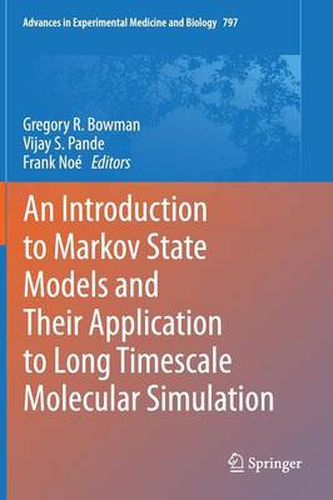Readings Newsletter
Become a Readings Member to make your shopping experience even easier.
Sign in or sign up for free!
You’re not far away from qualifying for FREE standard shipping within Australia
You’ve qualified for FREE standard shipping within Australia
The cart is loading…






This title is printed to order. This book may have been self-published. If so, we cannot guarantee the quality of the content. In the main most books will have gone through the editing process however some may not. We therefore suggest that you be aware of this before ordering this book. If in doubt check either the author or publisher’s details as we are unable to accept any returns unless they are faulty. Please contact us if you have any questions.
The aim of this book volume is to explain the importance of Markov state models to molecular simulation, how they work, and how they can be applied to a range of problems.
The Markov state model (MSM) approach aims to address two key challenges of molecular simulation:
1) How to reach long timescales using short simulations of detailed molecular models.
2) How to systematically gain insight from the resulting sea of data.
MSMs do this by providing a compact representation of the vast conformational space available to biomolecules by decomposing it into states sets of rapidly interconverting conformations and the rates of transitioning between states. This kinetic definition allows one to easily vary the temporal and spatial resolution of an MSM from high-resolution models capable of quantitative agreement with (or prediction of) experiment to low-resolution models that facilitate understanding. Additionally, MSMs facilitate the calculation of quantities that are difficult to obtain from more direct MD analyses, such as the ensemble of transition pathways.
This book introduces the mathematical foundations of Markov models, how they can be used to analyze simulations and drive efficient simulations, and some of the insights these models have yielded in a variety of applications of molecular simulation.
$9.00 standard shipping within Australia
FREE standard shipping within Australia for orders over $100.00
Express & International shipping calculated at checkout
This title is printed to order. This book may have been self-published. If so, we cannot guarantee the quality of the content. In the main most books will have gone through the editing process however some may not. We therefore suggest that you be aware of this before ordering this book. If in doubt check either the author or publisher’s details as we are unable to accept any returns unless they are faulty. Please contact us if you have any questions.
The aim of this book volume is to explain the importance of Markov state models to molecular simulation, how they work, and how they can be applied to a range of problems.
The Markov state model (MSM) approach aims to address two key challenges of molecular simulation:
1) How to reach long timescales using short simulations of detailed molecular models.
2) How to systematically gain insight from the resulting sea of data.
MSMs do this by providing a compact representation of the vast conformational space available to biomolecules by decomposing it into states sets of rapidly interconverting conformations and the rates of transitioning between states. This kinetic definition allows one to easily vary the temporal and spatial resolution of an MSM from high-resolution models capable of quantitative agreement with (or prediction of) experiment to low-resolution models that facilitate understanding. Additionally, MSMs facilitate the calculation of quantities that are difficult to obtain from more direct MD analyses, such as the ensemble of transition pathways.
This book introduces the mathematical foundations of Markov models, how they can be used to analyze simulations and drive efficient simulations, and some of the insights these models have yielded in a variety of applications of molecular simulation.